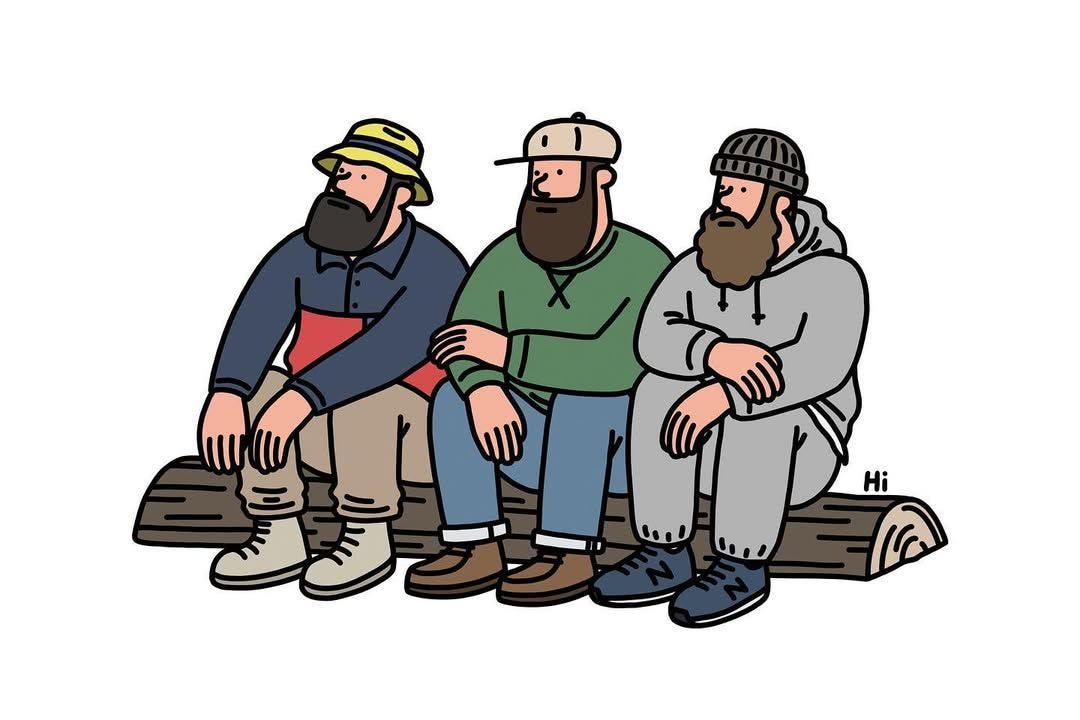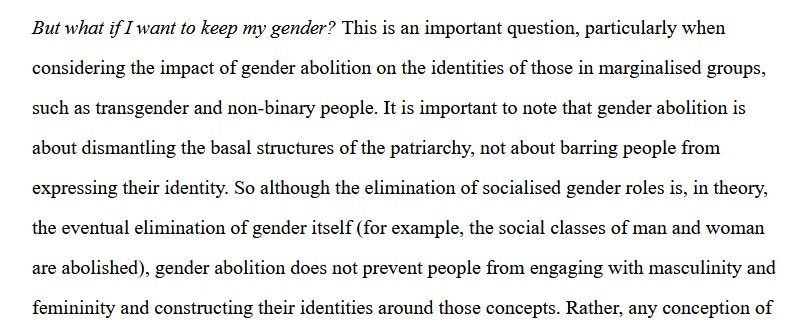“But I like my masculinity…”
This is a thing I have heard many times from men, especially when they are confronted with the idea that gender is a social structure, and if that’s the case then it can be undone. Gender abolition is an idea that a lot of people who study gender come across many times. The idea is simple, if gender is causing so many problems in the world, then why don’t we abolish it. What’s making us sit with this frankly made up identity in this world?
Well…a lot.
Identity and authentic expression is at the core of what makes us human, and that is evident with what this man is saying. “But I like my masculinity” is saying “I like my identity, and I don’t think you have a right to decide if it exists or not.” And that man is right.
I have time for the gender abolition debate, but this is the crux of the matter: For some, throwing away the ideas of gender can be easier than others. In fact, I would say that for most, throwing away gender is not only hard, but would be akin to losing who they are as a human. So to say we can just throw away gender to solve societal issues just like that I think is naive.
On the other side of the debate are the positive masculinity people. The people that say that we can keep our gender and expect that masculinity should be, for lack of a better term, softer.
More emotionally expressive
Kinder
Happier
Positive masculinity has been associated with men crying, men wearing a dress, men helping each other out, men talking, men having salads, men wearing earrings, men hugging, men cooking, men cleaning, men having coffee together, men dancing. Among many other things. If I were to take everything that people claim to be positive masculinity, I would say it’s “men doing things that are traditionally feminine.” To me it always felt from moving from one strict gender box to another.
In a more good faith thought, I would say positive masculinity ideology is a starting point. A place to expand on those thoughts, read some more, examine what’s going on not only individually but systemically, and move on from there. Usually that’s what a lot of my favourite gender writers end up doing. Yet for the most part, many others just stop at positive masculinity without questioning it.
As Celeste Davis posits in her brilliant essay here, Positive masculinity to me is just femininity repackaged.
Celeste writes:
“I’ve noticed that when it comes to gender discussions, most men agree we should foster more healthy relationships for men.
They are on board with having more access to community. They want love, friendship and strong connections.
We’re all one happy team on these points.
But the very second that you mention that the way to get there might involve embracing some feminine-coded skills like vulnerability, compassion and emotional openness…
Op.
You’ve lost them. Especially if you use the word “feminine.”
This is bang on, and ironically this is also the reason why a lot of gender teachers (people who work with men specifically to talk about the patriarchy or men’s mental health as some people have repackaged this), have stopped using the term “toxic masculinity.” The reason being in a nut shell is that men don’t like to hear it. They don’t like to hear that masculinity is toxic, and also they don’t like to hear that a more emotionally version of masculinity is feminine. What a knot we’re in.
I’m a person who ends up speaking with men sometimes, and I have no issues saying the words “toxic masculinity.” I believe exposure therapy is the way, I believe that if someone has an issue with that term that they haven’t really dug into what that term really means, and usually when that happens they end up agreeing that sometimes a lot of the things men traditionally do, cause harms and issues and that’s called “toxic masculinity.” But then…
“But you’re saying masculinity is BAD”
“I’m specifically not”
“A lot of people are saying men are bad. I like my masculinity!”
When this happens eventually we’ll talk it out and come to some sort of agreement, however I insist that I say the words. The point being is that the words “toxic masculinity” is not the problem. It’s men’s perception that people are going to take their identity away.
“Act More like Women”
My favourite new punching bag, Scott Galloway said in an interview for Maria Shriever’s Sunday Paper:
Since I wrote that article, I have come to appreciate Scott Galloway as an every person, a masculinity simpleton who has his feelings in the right way, but completely misses the mark with what he says (why people believe he’s some sort of expert, I don’t know). So I take what he says as the chorus of the well-intention but simple minded guy. He voices out this binary that a lot of men are feeling. Either you act like a toxic guy or you act like a women. Not knowing that there many other ways to be a man. However to think in this third, maybe new, maybe enlightened way, men have to do two things:
Explore the expanse of what masculinity has to offer men
Hold this identity less tightly
Number 2 will be the hardest part, but let me address the first part.
Expanding the Landscape of Masculinity
Here's what I want to say about the first part: masculinity is far more expansive than what we've been told. The research is clear on this. When we look at men's actual experiences, rather than the narrow stereotype men have been handed, we find something much richer and more complex.
Men used to wear dresses, a lot. Some men still do. Some masculine cultures still do.
Men used to hold hands and be closer with each other. Some men still do.
Men used to dance and write and care-take more freely.
Men out there are emotionally mature and caring and work to be that way.
Men have always had access to these different expressions of masculinity. Men just haven't been allowed to admit it. Especially within their cultural group. Allowing to admit it would be dangerous to their identity because someone (mostly other men) would question that identity.
The difference between how they express masculinity is not a biological one—it's a cultural one. One that’s been entrenched for centuries. Expression outside of that traditional cultural space is seen, like Galloway has said, as “acting like women.” But the key word here is 'expression'—not feeling, not capability, but expression.
The full scale of masculinity includes tenderness, vulnerability, fear, sadness, nurturing, softness, and yes, even what we might call more traditionally 'feminine' qualities.
However, and this is something that a lot of gender specialist find hard to say, the full scale of masculinity also is owning a truck, wearing plaid, playing sports, and other expressions of gender that fit into the traditional mould. None of those activities in of itself are harmful, those activities are some men, especially North American men, feel the most “manly.” But it is part of the spectrum of masculinity. None of these make a person less of a man. None of these make them more of a man. They make a person who happens to be a man.
When I think about the men in my life who feel most comfortable with their masculinity, they're not the ones who are the most rigid about it. They are the ones that will do something traditionally masculine and something traditionally un-masculine, and not make it their thing. They're the ones who can cry when they're sad, who can be gentle with their children, who can admit when they're scared, who can ask for help when they need it. They are also the ones who may wear plaid, or wear a dress, and make it who they are as a person rather than the performance of masculinity or un-masculinity. They're the ones who embody their own view of identity rather than performing it.
But here's the thing—and this is where the second part comes in—all of this expansion only works if men are willing to hold the identity of masculinity less tightly.
The Practice of Neutral Masculinity
Identity is not something that we can give away freely. This is why I find talks of gender abolition to be fruitless. To be fair, when some people speak about gender abolition they speak specifically to social systems holding gender tightly .
However, that’s not what some people who will speak about this at length will say either. And it’s not what men, especially people like Scott Galloway, our masculinity simpleton will hear.
The reason being is that men have been told to hold their identity around masculinity as tight as possible. That manliness equals success. This is a form of patriarchial systems, because those men are right. We have seen time and time again that the more “manly” someone acts or expresses themselves, usually the more success they have. Be it through financial success, or accessing certain parts of the culture.
The issue comes when people use that masculine identity as their sole guiding identity. Because the other form of patriarchial society is that men’s masculinity is always in a precarious state. A house of cards waiting to be toppled. This is why you have the manosphere. This is why you have grifters and charlatans begging men to take their course, or read their book, or listen to their content so they can be better men more rigid men. That is all a charade. A scam. This is where men become lost, become confused, and become lonely.
So I want to try something out here, call it neutral masculinity—a way of being that neither celebrates nor demonizes masculine traits, but simply recognizes them as one way of being human among many.
This is not new. In fact this is a part of gender abolition, if you don’t take the abolition part very seriously.
Neutral masculinity is not about being masculine in the right way or the wrong way. It's about recognizing that masculinity is a personalized set of values as a man, they are neither positive or negative and neither are anyone else. It’s just holding lightly what masculinity means in that person’s point of view.
This requires a lot of men to stop thinking of masculinity as a precious possession that can be taken or gained.
The double edged sword here is that for a lot of men, this also means that they would have to find identities that don’t involve masculinity, a practice that we as guys don’t have a lot of skill in. Because everything we do we have learned to perceive as either masculine and un-masculine.
The way we do our hair
The way we dress
The way we walk
The things we play with
The way we talk
Everything
I’ll tell you the funniest time a guy tried to bring down my masculinity, and one I still think about because I thought it was so absurd. I got a white iPhone 5, and my guy friend looked over at my phone and said “does that come with a tampon?” I was in my 20’s and I did a double take, like “Are you serious?” Even at that time, I thought how sad this was. That for this guy a white iPhone made him feel like it was made for women. Imagine if I got a pink one? Stuff like this happens all the time for guys.
So for someone to say “well you can just live without thinking about gender” right now, in this world, seems like an impossibility, and frankly a non-starter for a lot of people.
I personally don’t mind thinking of myself as a guy, but it’s not in competition to all the other identities I carry, including ones like “hobby photographer” which I hold very lightly.
This is where the practice comes in. Instead of "I am masculine," it is "I practice masculinity."
Instead of "I am a man," try "I am someone who engages with my own masculine ways of being." The difference is subtle but profound. One is about identity, the other is about choice. And the choice is for masculinity neither to be positive or toxic, it’s neutral. It’s there. It’s present, it’s a part of who we are, and because society at large doesn’t stop reminding us that we are guys (in good and bad ways), now we are in control of what our masculinity looks for us.
This is also why I don’t disparage the man that says “….But I like my masculinity.” I don’t expect that man to give up their masculinity, but I do expect them to make better choices. To perform masculinity in a way that is healthy for them, and for others. Including in ways that may seem feminine.
This also includes the idea that femininity is not a bad thing, or performing masculinity through femininity won’t make you less of a man, or an evolved man, or a better man. It’s just different. It’s yours.
It’s in neutral. But it’s personal.
I know this is hard.
I know that for many men, the idea of masculinity as practice rather than identity feels like losing something fundamental about themselves. Many guys remind other guys about their own masculinity. Society reminds guys about being a man. But I think what we're actually losing is the fear that someone might take our masculinity away from us.
When we practice masculinity rather than cling to it as identity, we become more flexible, more resilient, more capable of adapting to different societal changes.
You become more, not less, yourself.












I think what you're trying to say is that it's okay to be less masculine, which is fine.
But to portray it as a 'better' form of masculinity implies that more masculinity is always worse which is not true.
It's just less of something can equally be good or bad.
The pretension of expectations that I ought to be anything beyond some "gender-neutral" amiable, cooperative and courteous to strangers seems absolutely and without equal the height of human stupidity. I've been in a spectrum of blue collar, tough nut jobs - in huge companies that are responsible for not blowing up the homes we all live in, I might add - where I needed to not only talk "man-talk" about raping, drug use and firearms to fit in; but behave like an extremely poorly behaved child just to not be targeted. I've seen "masculine" men treat a more trans-woman(?) presenting person with more respect if they show their masculine role markers than they will with non-ego posturing, role-rejecting person like me. "Manhood" and masculinity is extremely stupid and toxic but maybe people who don't know themselves on whatever we might call a self-aware or "spiritual" level will need a role, a false self, to cling to in order to exist under the weight of fragility or to weather whatever violent, "masculinity"-dominated context they find themselves in. I would hope "masculinity" is something every man outgrows; but I won't hold my breath as violent stupidity is unfortunately a tenable survival strategy.
Male sexuality, sure, I like wearing that hat at appropriate times, because it's my body and what I sense and it's only able to be reasoned through by me once I accepted and listened to my emotions and other sensations. I put zero stock in the notion of gender norms or roles when thinking about myself at all, when making justice and logisitic decisions with my wife of nearing 20 years, when I parent my son or daughter, or when dealing in my now more reasonable and livable (DEI-heavy, union and pleasant) job culture. Gender norms are a whole lot of "supposed to's" rather than what I am going to do and what I want, desire, need, feel, agree and have to do; and "supposed to" is just received bad culture and pretty much half-assed thinking. How often does anyone get what they want in life doing what they are "supposed" to do in terms of gender norms? I know who I am and how I feel and how I want to be and exist, and envy no one; and who I am is so many other things beyond whatever the heck gender normed "masculinity" or even "femininity" tells me I'm supposed to be, and theres so many better "identities" to organize my soul around and psychological strategies to build a life and a family around than these, frankly, idiotic notions of anyone having to be this or that based on notions of one's genitalia and physiology, or subverting the absense or presence, or ambiguity of one's genitalia and physiology. The Way anyone ought to be becomes clear when we give up the expectations and pretensions and start traveling.